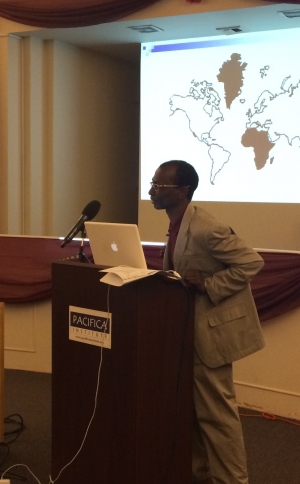Distinguished speaker of the night, Dr. Mutombo Nkulu-N’Sengha, started with these words of reflection, “Interreligious dialogue is a topic that is very dear to my heart,” and spoke of the fact that the dialogue between the Jews, Christians, and Muslims, which he had observed early in his life while in Indonesia, had been an inspiration for him to pursue a career towards this endeavor.
In explaining the grounds for choosing to speak particularly about Islam and about the African continent, Dr. Mutombo painted a detailed picture and gave specific information regarding the demographics of the region and the significance of Islam as the fastest growing religion in the world. “Looking way back into history we can say that Africa was, in one sense, where a lot of knowledge and learning first arose and grew from, so we can say that knowledge is not a foreigner to the people of Africa,” stated Dr. Mutombo as he reflected on the significant position of Africa among world nations. He also shared important statistics, which put Islam and the African continent into better perspective in order to better understand the relationship between the two. Of the total population of 1.6 billion Muslims around the world, approximately 350 million of them are from Africa, which itself has a total population of 1 billion, Dr. Mutombo explained. When we look at the current situation among the people of Africa, some claim that Islam is an African religion, some claim that Christianity is an African religion and still othera claim that such religions only brought about political separations and thus there is a need to bring back the ancient traditional beliefs, which were much more tolerant, he continued. Because traditional practices intermingle with how people actually practice their respective religions in their everyday life, the need to have dialogue between these faiths is essential, said Dr. Mutombo.
In questioning whether such a dialogue is truly possible in terms of the teachings of the religions, Dr. Mutombo highlighted certain aspects of the “spirit of Islam”—as he defined it—that supported and made such a dialogue possible. The principles of equality, peace, non-violence, abstaining from compulsion, the teaching of the golden rule (shared value in many faiths), the fact that God is known as being the Most Compassionate Most Merciful, the principle of social justice, the encouragement to ask questions in order to deepen one’s faith, and the fact that Islam sees itself as a continuation of Judaism and Christianity are all ways that display the openness of Islam to interreligious dialogue, commented Dr. Mutombo.
Throughout his speech, Dr. Mutombo also touched upon certain aspects of the ancient traditional religions and practices that are also observed throughout the continent of Africa. The essence of being truly human, or Bumuntu, is built on the distinction between good and evil, or better yet, of being human or non-human, he explained. You cannot mistreat another, because we are all in this world living together. True knowledge is to live in harmony with other human beings. In this way, Dr. Mutombo approached the central point of his lecture, saying, “If we study carefully, we can find points of agreement among different faiths where we can be in dialogue with each other.”
He concluded by quoting from different scholars; “He who knows one, knows none,” and “There will be no world peace without dialogue between religions, there will be no dialogue without learning of the other.” Following the lecture was an interesting Q&A session in which Dr. Mutombo answered the questions with wisdom and reason. Afterwards, the guests enjoyed some conversation time among themselves as they enjoyed the treats prepared by the Pacifica volunteers.

